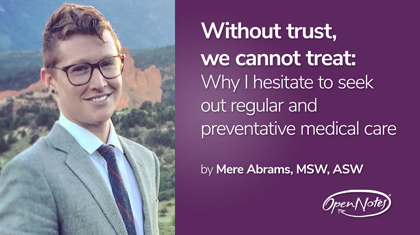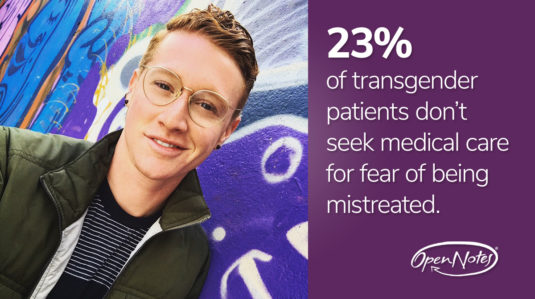
by Mere Abrams, MSW, ASW
SAN FRANCISCO, CA – Each time I go to the doctor, I pause before opening the door to the waiting room and take five deep breaths. I have no idea how I will be addressed, read, or referred to, even if it’s not my first appointment. As a trans nonbinary person who uses gender-neutral pronouns and does not identify with the sex assigned to me at birth, there are a whole range of potential challenges that might surface during the time at my doctor’s office. My medical records have the label female stamped all over them, yet my appearance and presentation are typically seen as male. I don’t identify as either. The forms I’m asked to complete do not even have a place that allows me to differentiate between my gender and assigned sex. These expectations and past experiences set the tone for all of my medical visits. Even with the best intentions, I must assume my presence will be met with confusion and discomfort.
There are efforts within medical and mental healthcare systems to address the lack of agency and power patients feel in asserting their needs and advocating for themselves. OpenNotes, a movement advocating for the sharing of visit notes between providers and patients, is central to this work. There are few spaces in the world that are equipped or make an effort to acknowledge my trans nonbinary gender. I often wonder what it would take to evolve each space and the interactions therein, to better account for my existence.
23% of transgender patients don’t seek medical care for fear of being mistreated
Every interaction— from presenting my I.D. to the front desk staff, to being assigned a room, or completing an intake with the medical assistant or nurse, to finally seeing the provider— has the potential to either be affirming or invalidating and uncomfortable. The 2015 U.S. Transgender Survey (n=27,715 transgender individuals 18+) asked respondents about their experiences in medical care. 23% of transgender patients reported not seeing a doctor when necessary for fear of being mistreated, including being referred to using the wrong name and pronoun, being asked inappropriate questions about gender or sex, or simply being treated “differently” than other patients.
As someone who is part of that 23%, I believe that if I were able to see that my medical records and visit notes reflect a respectful, accurate, and appropriate representation of who I am, I would feel much less fearful of mistreatment and much more able to trust my provider. I would be more likely to get the care I need regularly and preventatively.
When I walk into the doctor’s office, I want to connect with my provider. I have the strong desire to be seen accurately, and am often disappointed when I leave without that validation. I hope to develop a trust and rapport that creates a sense of safety in disclosing my gender. In an ideal world, I would walk into a return appointment reassured there is record of my chosen name, pronoun, and gender identity. This would not only help eliminate my existing fear, but would begin to rebuild my trust in a system history has shown is not yet equipped to prioritize or understand my needs as a trans nonbinary person. OpenNotes provides both patients and providers with the tools to do just this.
Openness reduces the power imbalance
The culture change OpenNotes represents helps medical settings move closer to creating a gender affirming and sensitive environment for all patients. By systematizing the sharing of notes between patients and providers, OpenNotes reduces the power imbalance inherent in medicine through a mechanism that allows the patient to review the record, provide direct feedback, and request changes to make the record accurate. OpenNotes research shows that patients who are able to read their notes feel heard, listened to, and cared for, alluding to a strengthened therapeutic alliance based in shared values and goals.
One is not required to work in a school or with youth to benefit from acknowledging Spirit Day. We in the medical field must show support for LGBTQ youth and take a stand. We each have a role to play in creating a safe environment that celebrates the unique qualities in all of our patients. OpenNotes is a powerful tool that helps facilitate an informed, safe, caring, and validating experience for all patients who may feel afraid and misunderstood.
With OpenNotes, my doctor’s office becomes one of the few places in this world that acknowledges, validates, and is affirming of my gender.
Mere Abrams, MSW, ASW, is a gender specialist, advocate, and clinical researcher at the University of California, San Francisco currently engaged in a research project funded by the National Institutes of Health studying metabolic, mental health, and quality of life issues for trans, nonbinary, and gender expansive youth undergoing treatment with puberty blockers or cross-sex hormones.

READ MORE: Optimizing the Clinical Care of Lesbian, Gay, Bisexual, and Transgender Older Adults, JAMA Viewpoint




You must be logged in to post a comment.